Meal planning templates for caregivers help you organize meals, reduce stress, and guarantee balanced nutrition for those you care for. They streamline shopping, keep ingredients handy, and maintain routines for breakfast, lunch, dinner, and snacks. Customizable options make it easy to adapt to dietary restrictions. Using these templates saves time and simplifies meal prep. Keep going to discover how you can choose the best templates and tools to keep your schedule efficient and nutritious.
Key Takeaways
- Provide customizable weekly meal plans to streamline caregivers’ routine and reduce decision fatigue.
- Include sections for balanced nutrition, dietary restrictions, and portion control tailored for care recipients.
- Offer organized shopping lists and pantry management tools to simplify grocery shopping and reduce food waste.
- Incorporate visual reminders and prep schedules to ensure consistent meal prep and timely feeding.
- Support digital integration for easy updates, tracking, and sharing across devices and with family members.
Benefits of Using Meal Planning Templates for Caregivers
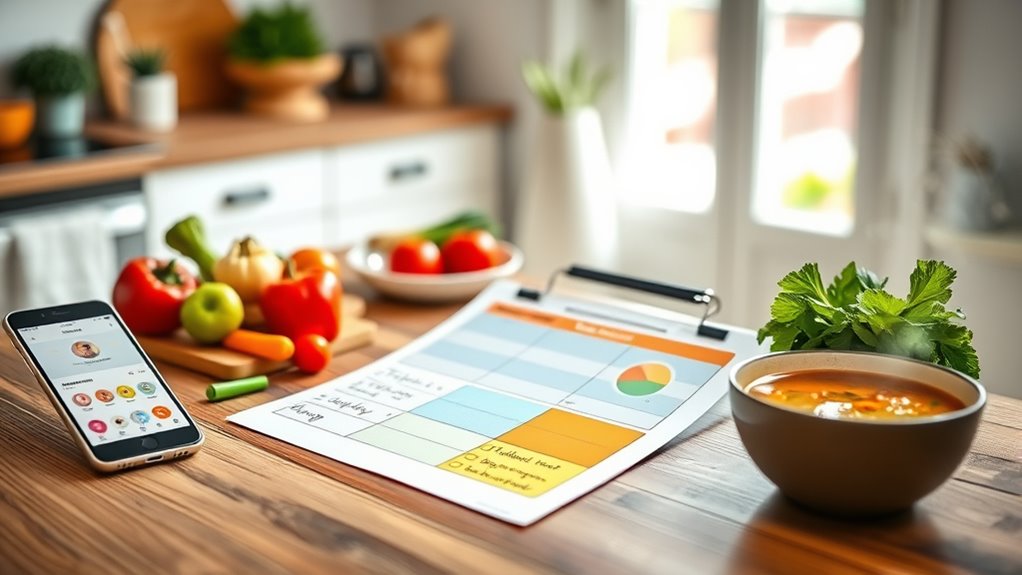
Using meal planning templates can substantially ease the daily responsibilities of caregivers. They streamline meal prep by providing structured plans, so you spend less time deciding what to cook and more time caring for your loved ones. These templates also improve kitchen organization, helping you keep track of ingredients, shopping lists, and meal schedules effortlessly. With a clear plan in place, you reduce last-minute stress and prevent unnecessary trips to the store. Meal planning templates promote consistency, ensuring balanced nutrition and reducing food waste. They also foster routine, which benefits both caregivers and those they care for. Incorporating skincare patch application schedules into your routine can further enhance overall well-being by addressing skin concerns efficiently. Overall, these tools save time, enhance efficiency, and create a more manageable approach to daily caregiving tasks.
Key Features to Look for in a Caregiver Meal Planner
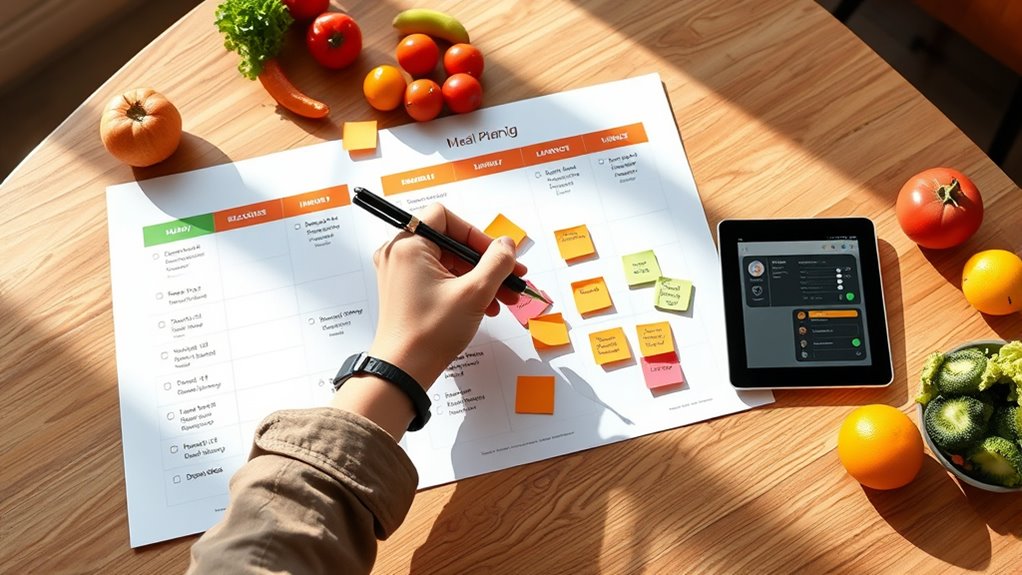
When selecting a caregiver meal planner, it’s important to focus on features that make daily meal management easier and more efficient. Look for tools that support precise meal portioning, so you can tailor servings to individual needs. Recipe customization options are essential, allowing you to modify meals based on dietary restrictions or preferences. Features like adjustable serving sizes help ensure each person receives the right amount. A clear, organized layout makes planning quick and straightforward. Additionally, look for:
Choosing a caregiver meal planner with customizable options simplifies daily meal management efficiently.
- Easy-to-use interface for quick adjustments
- Built-in nutritional information for balanced meals
- Customizable meal categories for variety
- Reminders for meal prep and portioning
- Compatibility with shopping lists for seamless prep
- Incorporating a high-quality display can improve visibility and ease of use during planning sessions.
These features streamline your routine and help you stay confident in your caregiving role.
Weekly Meal Planning Template for Busy Caregivers
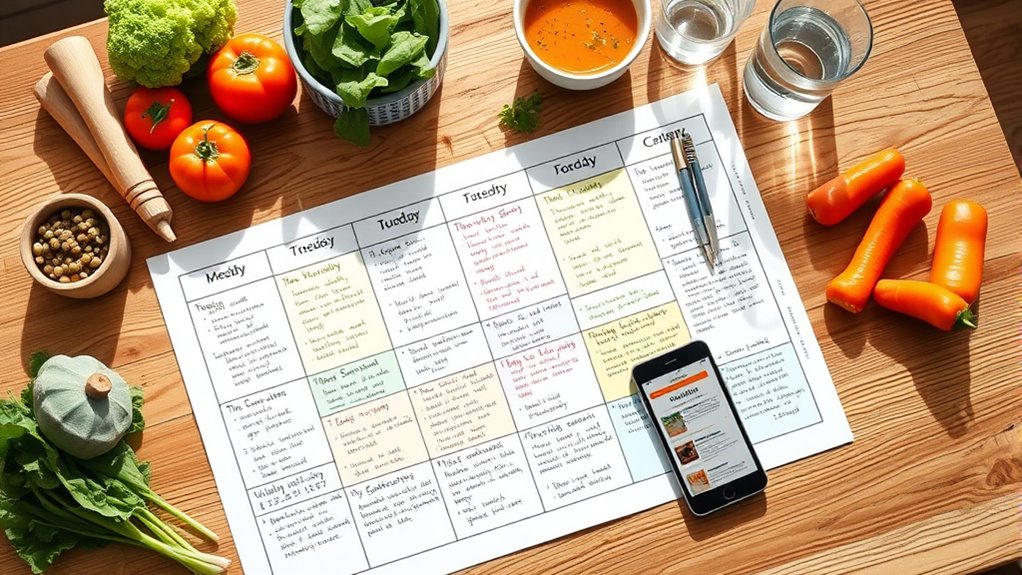
A weekly meal planning template can help you streamline your prep and stay organized. It makes it easier to balance nutritious meals while saving time during busy days. With the right template, you’ll feel more confident in maintaining a healthy, manageable routine. Incorporating cultural awareness into your meal planning can also make your menus more inclusive and engaging.
Simplify Weekly Prep
Ever feel overwhelmed trying to plan meals each week? Simplifying your weekly prep makes a big difference. Use a flexible meal planning template to outline your meals in advance, saving you time and stress. Focus on easy, repeatable recipes that streamline meal prep and reduce grocery shopping trips. Visualize your week with:
- Pre-chopped veggies ready for quick stir-fries
- Batch-cooked proteins for multiple meals
- Organized pantry items for easy access
- Shopping list tailored to your weekly needs
- Prep days dedicated to batch cooking and freezing
This approach helps you stay organized, avoid last-minute decisions, and make grocery shopping more efficient. By sticking to a plan, you cut down on time spent in the store and in the kitchen, making weekly prep manageable even on busy days. Incorporating meal planning templates can further enhance your efficiency and reduce stress.
Keep Nutritious Balance
Maintaining a nutritious balance in your weekly meal plan guarantees you and your family stay energized and healthy, even with a busy schedule. Focus on proper meal portioning to avoid overeating or undernourishment, ensuring each meal provides essential nutrients. Incorporate a variety of proteins, vegetables, grains, and healthy fats to cover your nutritional bases. Use smart cooking techniques like steaming, grilling, or stir-frying to preserve nutrients and reduce added fats. Batch cook and portion meals in advance to save time and prevent last-minute unhealthy choices. Keep a balanced mix of colorful produce and whole foods throughout the week. Additionally, selecting whole foods over processed options can significantly enhance the overall nutritional quality of your meals. By planning thoughtfully and practicing effective meal portioning and cooking techniques, you support your family’s health without sacrificing convenience.
Customizable Meal Schedule Templates for Different Dietary Needs
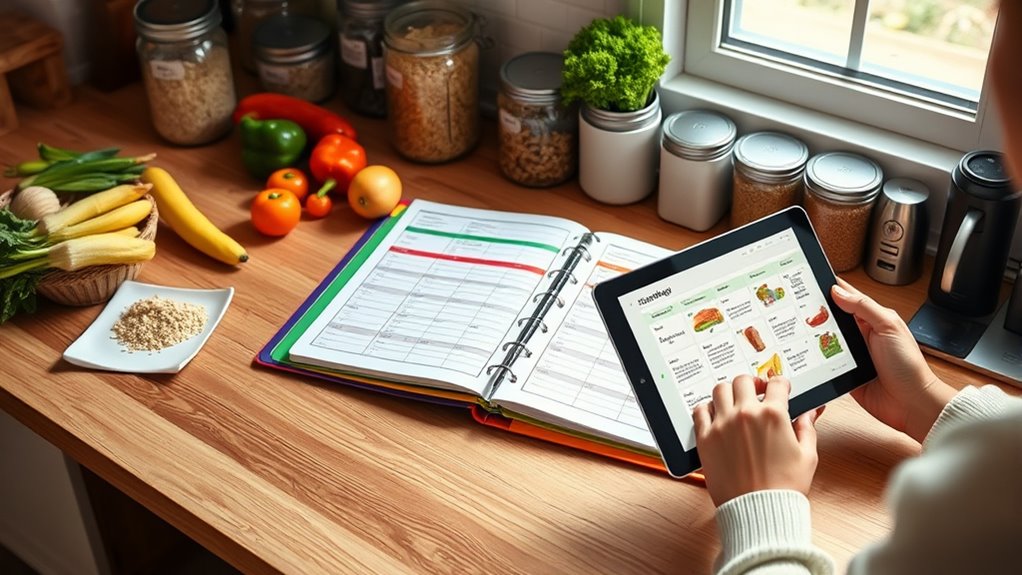
You can tailor meal schedule templates to fit various dietary restrictions, ensuring everyone’s needs are met. Flexible timing options make it easier to adjust meals around your daily routine, while specialized plans support specific nutritional goals. These customizable templates help you create balanced, practical meal plans that work for any lifestyle. Incorporating dietary considerations related to activity levels or health conditions can further enhance meal planning effectiveness.
Dietary Restrictions Accommodation
Adapting meal plans to accommodate various dietary restrictions can simplify choosing nutritious meals that meet individual needs. With customizable templates, you can easily include options for gluten intolerance or vegan diets, ensuring everyone’s dietary needs are met. Picture a meal schedule featuring:
- Gluten-free bread and pasta options
- Vegan protein sources like beans and tofu
- Dairy-free desserts
- Fresh vegetable sides for allergy sensitivities
- Alternative snack ideas for restricted diets
Using these templates, you can plan balanced meals that cater to specific restrictions without stress. Whether adjusting for gluten intolerance or providing vegan options, your meal schedule becomes a practical tool to promote health and variety while respecting individual preferences.
Flexible Meal Timing Options
Flexible meal timing options allow you to customize meal schedules to fit busy lifestyles and varying dietary needs. With flexible scheduling, you can adjust meal times to better align with your daily routine and energy levels. This approach helps reduce stress by providing the freedom to skip or shift meals when necessary, without disrupting overall nutrition. Using adaptable templates, you can plan multiple options for breakfast, lunch, and dinner, ensuring nutritional balance while accommodating unpredictable schedules. Whether you need early-morning meals or late-night snacks, flexible meal timing lets you design a plan that works for you and your loved ones. This method promotes consistency and reduces the temptation to skip meals, supporting better health and wellbeing. Additionally, understanding your body’s natural rhythms can help optimize meal timing for improved digestive health.
Specialized Nutritional Plans
Customizable meal schedule templates cater to specific dietary needs, enabling you to tailor your nutrition plan for health conditions, fitness goals, or ethical preferences. These specialized dietary plans help you make precise nutritional adjustments, ensuring your loved ones receive the right nutrients. Visualize a meal plan that includes:
- Low-sodium options for heart health
- High-protein meals for muscle building
- Plant-based menus for ethical choices
- Gluten-free snacks for allergies
- Diabetic-friendly carbohydrate control
With these templates, you can easily adapt ingredients and portion sizes, making sure each meal supports unique dietary requirements. This flexibility simplifies managing special diets, giving you confidence that every meal aligns with individual health goals while maintaining variety and flavor. Recognizing the importance of balanced nutrition ensures comprehensive care for those with specific dietary needs.
Easy-to-Follow Grocery Shopping Lists and Meal Prep Guides
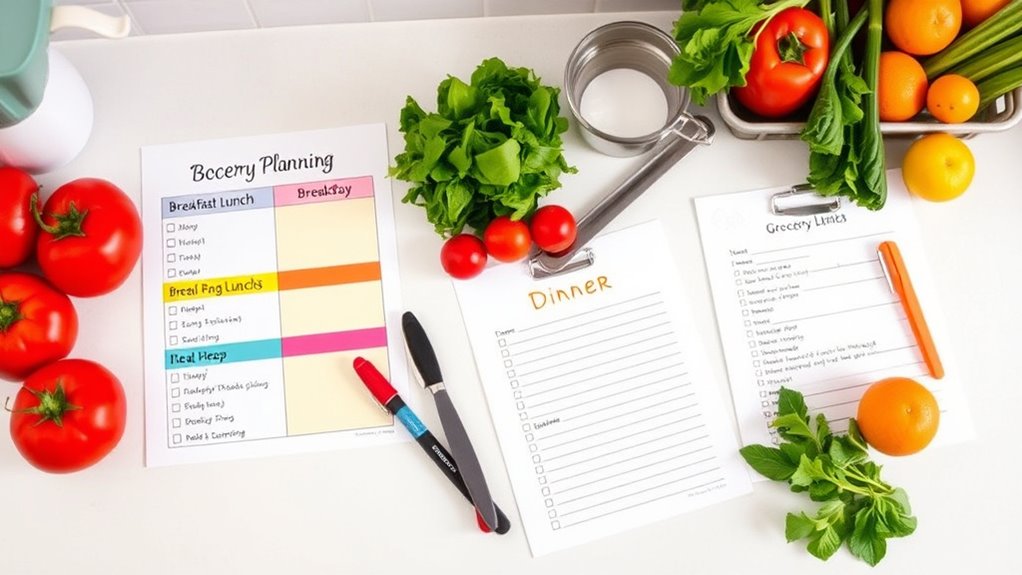
Creating clear and organized grocery shopping lists and meal prep guides can make a huge difference in streamlining your weekly routine. Start by applying simple shopping tips, like categorizing items by sections to save time and avoid forgetfulness. Keep your pantry organized so you can easily see what’s available, reducing duplicate purchases and waste. Use your lists to plan meals around ingredients you already have, making shopping more efficient. Meal prep guides help you batch cook and portion meals ahead of time, reducing daily stress. Keep your lists concise and specific to avoid confusion. Regularly updating your pantry inventory ensures you’re always prepared. Additionally, understanding food spoilage signs can help you avoid purchasing or consuming spoiled ingredients, ensuring safety and freshness. These strategies help you stay on track, save money, and ensure nutritious meals for your loved ones.
Sample Meal Planning Templates for Elderly Care
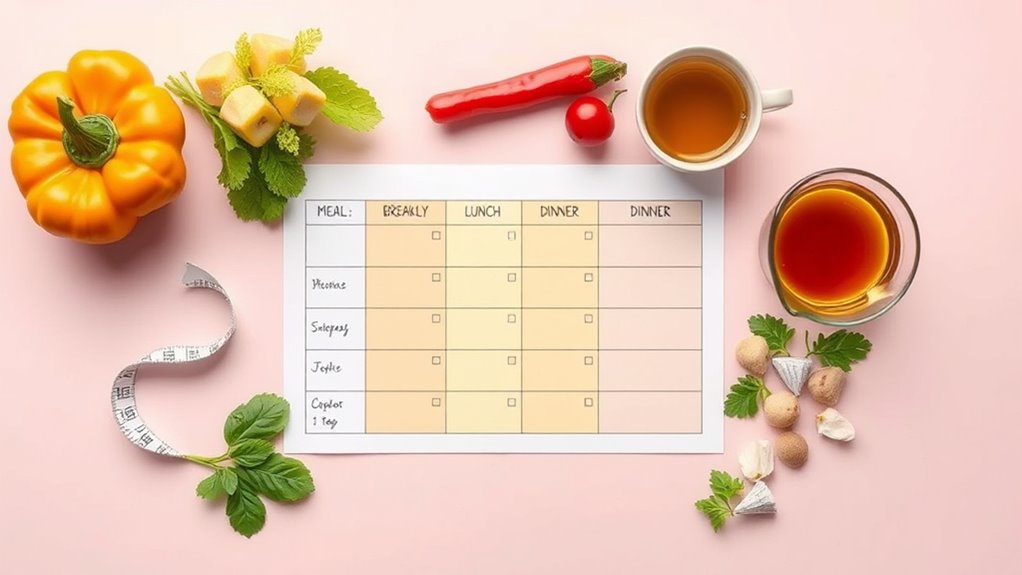
When planning meals for elderly loved ones, using structured templates can simplify the process and guarantee nutritional needs are met. Sample meal planning templates provide a clear layout for balancing food groups, portion sizes, and cooking techniques. They often include sections for breakfast, lunch, dinner, and snacks, emphasizing variety and meal presentation. Imagine visualizing:
- Colorful vegetable sides that brighten the plate
- Soft, easy-to-chew protein options
- Simple cooking techniques like steaming or baking
- Well-portioned servings to prevent overeating
- Garnishes that enhance meal appeal
These templates help you streamline meal prep, focus on nourishing ingredients, and ensure appealing meal presentation. Incorporating versatility of hybrid bikes insights can inspire the inclusion of diverse food options suitable for different dietary needs. By following these guides, you make mealtime easier, more nutritious, and visually inviting for your elderly loved ones.
Digital Tools and Apps for Meal Planning on the Go

In today’s busy world, digital tools and apps make meal planning more convenient than ever, especially when you’re on the go. Meal planning apps help you organize menus, create shopping lists, and set reminders, streamlining your daily routine. Digital meal trackers allow you to log and monitor nutritional intake, making it easier to guarantee your loved ones get balanced meals. These tools sync across devices, so you can update plans during errands or appointments, avoiding last-minute stress. Many apps also offer customizable templates tailored for caregivers, helping you plan meals quickly and efficiently. By utilizing these digital resources, you stay organized, save time, and maintain a nutritious meal schedule, even with a hectic caregiving schedule.
Tips for Staying Consistent With Meal Planning as a Caregiver
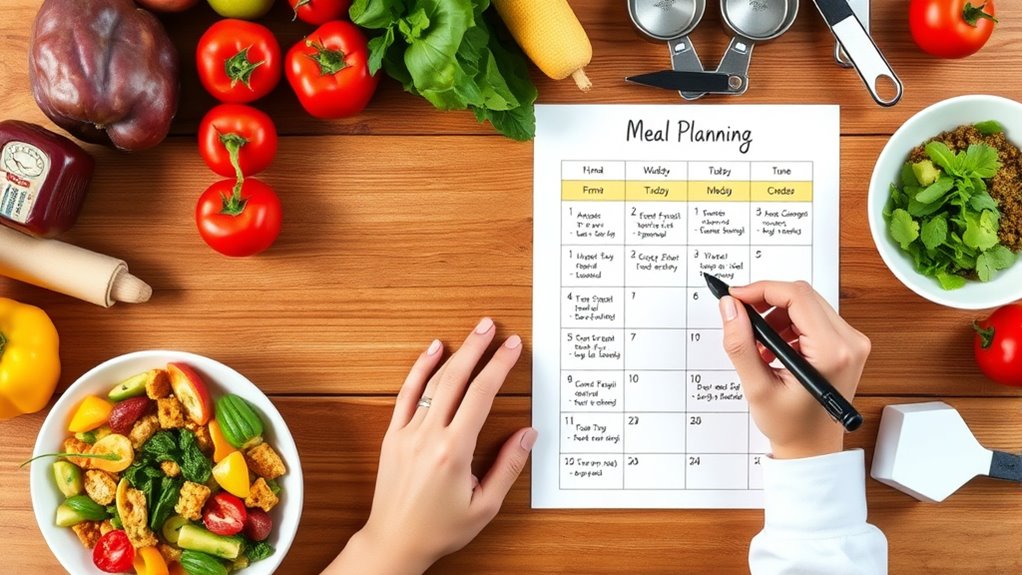
Staying consistent with meal planning as a caregiver can be challenging amid busy schedules and unpredictable demands. To keep on track, establish simple meal prep routines that fit your routine, such as prepping ingredients on weekends or batch-cooking meals. Keep snack ideas handy—think cut-up fruits, nuts, or yogurt—to prevent last-minute unhealthy choices. Create a visual reminder, like a meal calendar on your fridge, to stay accountable. Use containers to organize prepared meals and snacks, making grab-and-go options easier. Find support from family or friends who can share meal prep tasks or offer encouragement. Remember, consistency is a process—small, regular efforts will help you maintain a nourishing plan for your loved ones.
Frequently Asked Questions
How Can Meal Planning Templates Help Reduce Caregiver Stress?
Managing daily tasks can be overwhelming, but meal planning templates help you stay organized and save time. By having a clear plan, you reduce decision fatigue and free up mental space, which boosts your emotional well-being. With these templates, you can streamline grocery shopping and meal prep, making your days less stressful. Ultimately, they support better time management, helping you feel more in control and less anxious as a caregiver.
Are There Templates Suitable for Specific Medical Conditions?
You might wonder if there are templates suited for specific medical conditions. Yes, medical condition templates help you create customized meal plans tailored to unique health needs. These templates simplify planning by providing nutritional guidelines and portion sizes aligned with conditions like diabetes or heart disease. Using them, you can guarantee your loved one receives appropriate nutrition, reducing stress and making caregiving more manageable.
Can Meal Planning Templates Accommodate Special Dietary Restrictions?
Think of meal planning templates as a versatile toolbox. They can adapt to your unique needs with dietary customization, like adding special ingredients to suit specific restrictions. The key is template flexibility, allowing you to tweak recipes and portions as needed. So, yes, these templates can accommodate special dietary restrictions, helping you craft nourishing meals that respect individual health needs while keeping things simple and manageable.
How Often Should Meal Plans Be Updated or Revised?
You should update your meal plan regularly to guarantee it stays relevant and effective. The ideal meal plan frequency depends on your needs, but generally, revising every two to four weeks works well. This revision timing allows you to adapt to dietary changes, seasonal ingredients, and feedback from those you’re caring for. Staying flexible and reviewing your plan often helps you maintain balanced, nutritious meals that meet evolving needs.
What Are Common Challenges When Implementing Meal Planning Templates?
Did you know that 60% of caregivers struggle with meal planning? When implementing templates, you often face challenges like time management and template customization. These issues can lead to frustration or inconsistent meals. To overcome this, allocate specific times for planning and tailor templates to fit your needs. Staying flexible and organized helps you use your resources more efficiently, making meal prep less stressful and more manageable.
Conclusion
Think of meal planning templates as your guiding star, illuminating your path through busy caregiving days. They help you stay organized and guarantee your loved ones are nourished, even when the night feels long. By embracing these tools, you create a steady rhythm—a heartbeat—that keeps your caregiving journey steady and compassionate. Let these templates be your lighthouse, guiding you safely to well-fed smiles and moments of peace amid life’s storms.









